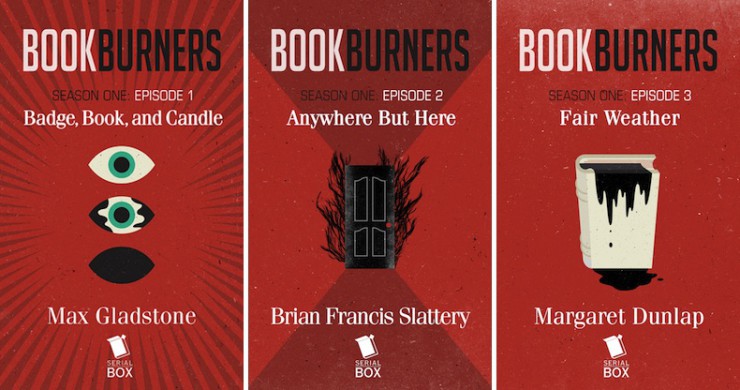If you’ve ever played a tabletop RPG, you’ve felt that golden moment—you’ve just made a quip or a clever move, you’ve turned the tables on a cunning adversary, you’ve committed the most hilarious mistake, and the room lights up. Friends laugh, or stare in horror. You’ve compelled.
This isn’t just a gamer thing, either. We—humans, I mean—started telling stories long before we committed them to so crude a medium as paper. That instant audience feedback is built into the rhythms of our conversation. This makes writing novels (which I spend most of my time doing) a little awkward, since for the most part the writer’s deprived of that experience. Yes, there are compensations—but you don’t get that great moment when you can swerve in a weird direction and double down on awesome precisely because you feel how much the audience is into your jam.
That’s one of the reasons I’ve enjoyed spending much of the last year working with Margaret Dunlap, Mur Lafferty, and Brian Slatterly to build Bookburners, the first serial from Serial Box. Last year Margaret, Mur, Brian, and I sat down to develop our world, and as we debated characterization and arc plots and setting details, we traded moments of compelling and being compelled. “Yes! That’s a fantastic idea! And furthermore—” “Hm, maybe not quite that, but this.” “What if he is actually—”
Gold.
And it gets even better!
We all built the story world together, developed a season arc, and then split off to write individual episodes of that arc, each about fifty pages long. Which is when we all got to see how our own ideas were transformed and transfigured in the other writers’ minds. It’s like the best kind of boomerang.
There’s another advantage to the shorter serialized format, again speaking as a gamer turned novelist: I so rarely get to see real-time reactions in an audience these days. Many’s the time I’ve forced someone to sit down so I could show them the first episode of a cartoon, or handed someone the first issue of a comic and said, “read!” You can’t do that with a book that will take most folk eight hours to work through—well, you can, but you need handcuffs. But a Bookburners episode—I’ve handed them to friends and watched. And when the eyes light up—
Well, like I said. Gold.
More About Serial Box:
This September, new publisher Serial Box is bringing everything that’s awesome about TV (easily digestible episodes, team written, new content every week) to what was already cool about books (well-crafted stories, talented authors, enjoyable anywhere). New episodes will release every >Wednesday and can be enjoyed on their own but build over the course of a season to tell a greater story. Episodes will be available in both digital and audio forms via their website, app, and wherever ebooks are sold.
The first serial is Bookburners, an urban fantasy adventure following a black-ops anti-magic squad backed by the Vatican. Wandering from police procedural to New Weird and dabbling in most genres in between, Bookburners will keep you hungry for more, week after week. Led by Max Gladstone (Choice of the Deathless and Three Parts Dead) the writing team includes Margaret Dunlap (Eureka), Mur Lafferty (The Shambling Guide to New York City) and Brian Francis Slattery (Lost Everything).
Check out the first episode, and get started with an excerpt from Episode 2 below:
Anywhere but Here
The family living downstairs from Gabriel heard noises above them and thought it must be the building. In the apartment upstairs, where Elena and Victoria lived, the family heard their floorboards creaking when they weren’t walking on them. Something was going on below their feet.
“Go down and see how Gabriel is doing,” the parents told their daughters. They knew he lived alone, and even if they didn’t know him well, they were worried about him.
So the daughters skipped down the stairs to Gabriel’s door. They knocked. There was no answer. They knocked again.
They felt a rush of air around their ankles, first toward the door, then away from it. Like a long, sighing breath.
Then the door opened, all by itself. And great hands, strong yet soft, scooped them up and took them in.
The girls didn’t get a chance to see what the apartment really looked like now. For Elena and Victoria, Gabriel’s apartment disappeared. Their own selves disappeared. They became wizard queens, floating in the air and creating kingdoms all around themselves with waves of their wands. They sprouted transparent wings from their backs and became pirate fairies, raiding ships and islands that floated in the sky. They were swooping dragons in a world where the only land was a sheer and never-ending cliff that disappeared into the clouds above and below them, and cities like gigantic mushrooms grew from trees that clung to the rocks. At last they were sea creatures they couldn’t have described to themselves, even as they were described in the book. They were slim beings with fins and gills, long, flowing tentacles, braids in their hair. They swam in a pink ocean among eight-eyed leviathans and a web of towns that drifted in the current together like a school of jellyfish.
They didn’t know where they really were, or what was really happening to them.
* * *
It took the girls’ parents a few hours to realize something was wrong. The sisters’ visits with Gabriel were never short. But the kids were always home before dinner.
“How long have they been down there?” their mother said.
The father looked up from his phone. He hadn’t realized how late it had gotten.
“I’ll go get them,” he said. He headed downstairs to the landing in front of Gabriel’s door. He could hear what he thought were voices. He could hear something, anyway.
“Elena? Victoria?” he called. They didn’t answer.
He put his hand to the door. It was warm, warmer than it should have been.
There’s a fire in there, he thought.
He called out his daughters’ names again. There was still no answer. He ran down the stairs to the superintendent, and they both came back up to Gabriel’s landing.
“Gabriel?” the superintendent called. “Are you in there? Are those girls with you?”
The superintendent tried his key. It turned, but it didn’t unlock the door. Then it stuck, as if held there. As if something had reached into the lock from the other side, something with very powerful fingers, and had latched hold of it.
The superintendent jiggled the key.
“I can’t even get it out,” he said.
“My girls are in there,” the father said.
“Gabriel!” the superintendent yelled. “If you don’t open this door in thirty seconds, I’m calling the police.”
They waited. It was quiet on the landing.
Then they felt the air move, all around them, from up and down the stairs, as if it were being drawn under the door to Gabriel’s apartment. They watched as the door flexed outward in its frame. It was inhaling. It was as obvious as it was impossible. They felt the wind rush around their ankles, first toward the door as it ballooned, then away, back into the stairwell, as the door smoothed and flattened again.
They looked at each other. Each one confirmed to himself that the other had seen it.
“Call the police,” the father said.











